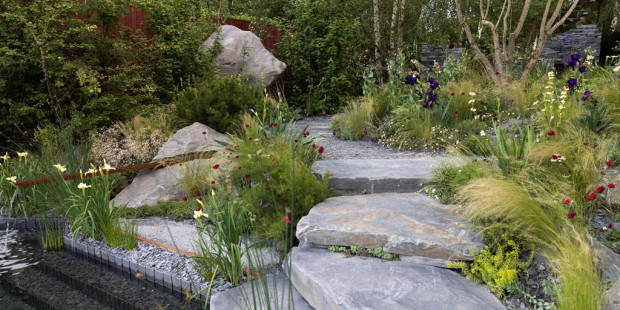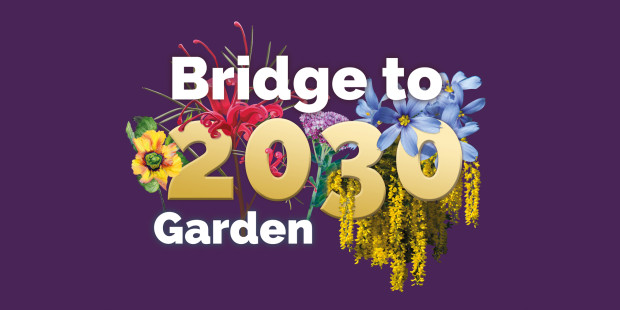A beautiful performance by Joyful Noise – a community choir for people living with HIV – was the highlight as we launched our first ever show garden at the RHS Chelsea Flower Show. The choir were cheered on by our co-founder Rupert Whitaker, patron Beverley Knight and long-time supporter Vicki Vivacious who was a stand out in the latest season of RuPaul’s Drag Race UK.
The garden, designed by Matthew Childs and made possible thanks to Project Giving Back, tells the story of the HIV epidemic in the UK starting in the 1980s when a HIV diagnosis was very different to today.
A falling tombstone engraved with ‘AIDS’ was the centrepiece of the Government’s awareness campaign at the height of the AIDS crisis in 1987, alongside the chilling message “it is a deadly disease and there is no known cure”.
The memorable health campaign undoubtedly saved lives – but there’s been huge progress in the fight against HIV since then. That’s why, almost 40 years later, the tombstone is being reclaimed by HIV charity Terrence Higgins Trust as part of its show garden – Bridge to 2030 – at this year’s RHS Chelsea Flower Show, which opens to the public on Tuesday 21st May.
The garden takes visitors on a journey from the fear and hopelessness of the 1980s to today where you can live a long, healthy life with HIV. The UK aims to be the first country in the world to end new HIV cases by 2030 and Terrence Higgins Trust is at the forefront of delivering that aim.
Richard Angell, Chief Executive of Terrence Higgins Trust, said: “There’s been huge progress in the fight against HIV since the 1980s, but too few people know about. That’s why we’re taking the inspiring message that we can be the first country in the world to end new HIV cases by 2030 to the Chelsea Flower Show. But currently that goal is possible not probable – which is why we hope those who visit or hear about our garden are inspired to join us in our life-changing mission to end this epidemic.”
The garden is the vision of award-winning designer Matthew Childs and has been made possible thanks to funding from Project Giving Back, the unique grant-making charity that funds gardens for good causes at RHS Chelsea.
Matthew Childs, garden designer of Bridge to 2030, said: “Our beautiful garden is the complete antithesis of where we were in the 1980s when HIV was a scary, fearful and dark proposition. While the original tombstone from those iconic adverts was symbolic of all that fear and darkness, we’ve reclaimed it as a bridge into our garden which is revealed as the water rises and falls. It’s surrounded by resilient crevice-style planting to symbolise the awe-inspiring strength of the HIV community over the last 40 years and their tireless fight for progress which means the end of new HIV cases is an achievable goal.”
The entrance to the garden is reminiscent of the flooded base of a rejuvenated quarry landscape. The water level rises and falls revealing a tombstone slate stepping stone, creating a bridge. The tombstone, which once represented fear, is now reimagined as a crossing leading to a beautiful secluded terrace symbolising a positive, hopeful future free from new HIV cases.
The garden is inspired by the recolonisation of plants in the redundant slate mines of North Wales by both nature and subtle interventions from ecologists and horticulturalists. To the front is a crevice garden, where plants grow in gaps between rocks. This represents the resilience of HIV activists who have survived through the most testing of times.
Granite boulders are scattered through the garden. One of these boulders balances precariously on the boundary and is supported by fragile sticks giving the illusion they are supporting its weight – representing those lost to HIV.
The UK government has committed to ending new HIV cases by 2030. The goal is possible thanks to highly effective ways of preventing, testing for and treating HIV, including the fact that people living with HIV and on effective treatment cannot pass it on to their partners.
Louise Vallace, Positive Voices volunteer at Terrence Higgins Trust, said: “When I was told I was living with HIV, my world completely changed. I spent the next 10 years in silence and didn’t tell a single person about my diagnosis. This resulted in low self-esteem and a lot of self-stigma based on out-dated myths about HIV. But, with the support of Terrence Higgins Trust, that all changed. The charity gave me the support, the platform and the framework to talk about living with HIV. That’s why I’m thrilled there is a garden about ending new HIV cases at Chelsea and I hope it will start many, many wonderful conversations about how much HIV has changed.”
More about Bridge to 2030 Garden
Visit our RHS Chelsea page, below, to find out more about our garden and our vital work to end new HIV cases by 2030. And, if you’re at the show, you’ll find us at site 328.



